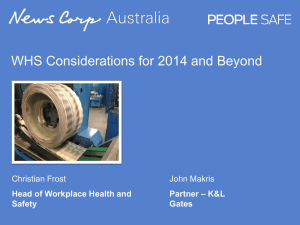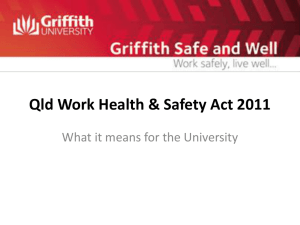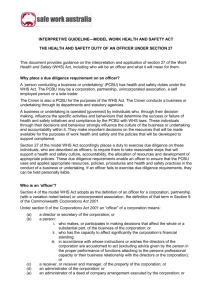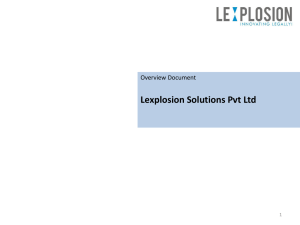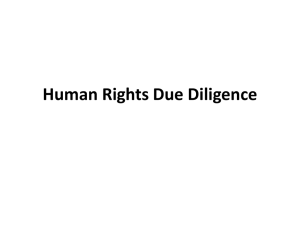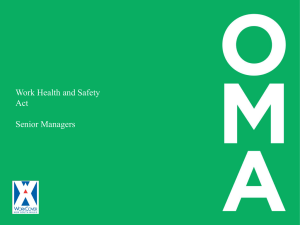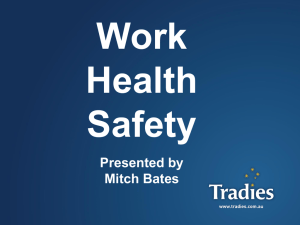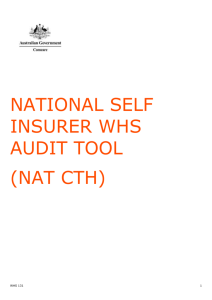Board Member Responsibilities for Work Health and Safety
advertisement
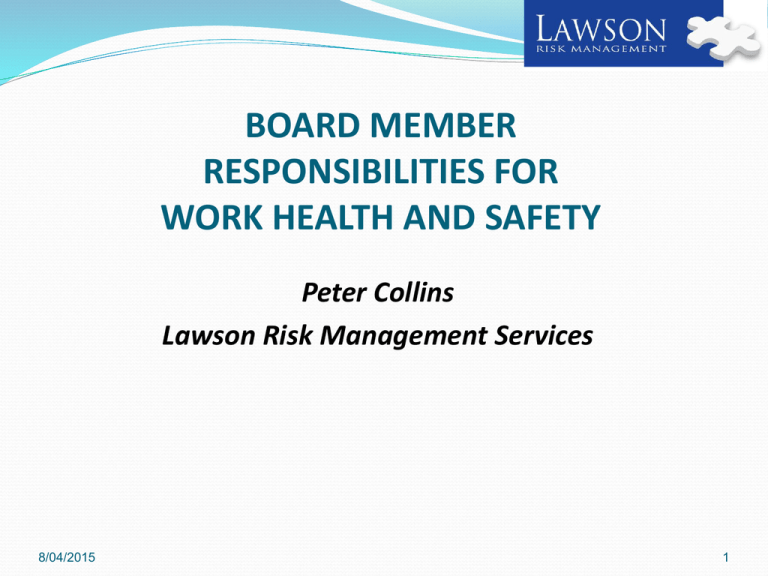
BOARD MEMBER RESPONSIBILITIES FOR WORK HEALTH AND SAFETY Peter Collins Lawson Risk Management Services 8/04/2015 1 Contents Introduction WHS Act Key Changes The impact on Employers How can Board Members as Officers demonstrate their compliance with their due diligence responsibilities? Questions? 8/04/2015 2 What does the new legislation look like? The WH&S Act 2012 (SA) sets out work health and safety responsibilities. The WH&S Regulations 2012 (SA) expand on the requirements of the WH&S Act, with specific direction on how to meet certain obligations of the WH&S Act. The Codes of Practice provide guidance on achieving the standard of health and safety that can apply to a profession, trade or industry. They provide detailed information on particular areas of the model WHS Act or model WHS Regulations, and outline activities, actions, technical requirements, responsibilities, and responses to events or conditions within a workplace. 8/04/2015 3 Codes of Practice 1. How to manage work health 2. 3. 4. 5. 6. 7. and safety risks Work health and safety consultation, Cooperation and Coordination Managing the work environment and facilities Hazardous manual tasks Managing the Risk of Falls at Workplaces Labelling of workplace hazardous chemicals How to manage and control asbestos in the workplace 8/04/2015 Facilities for construction sites 9. Managing the Risks of Plant in the Workplace 10. First Aid in the Workplace 8. Managing the Risks of Hazardous Chemicals in the workplace 12. Managing Electrical Risks at the Workplace 11. 4 What is new for S.A. under the new WH&S Act? an employer will become known as a ‘person conducting a business or undertaking’ (PCBU); and Employees will become Workers; a volunteer association will have duties under the model WHS Act if it employs a worker; a health and safety representative, after completing training, will be able to issue provisional improvement notices and direct that unsafe work cease; a union can apply to the Industrial Relations Commission of South Australia for a Work Health Safety entry permit, allowing the permit holder to enter a workplace under certain circumstances; 8/04/2015 5 What is new for S.A. under the model WHS Act? a capacity to enter into a WHS undertaking following a breach of the legislation instead of a prosecution; the removal of the Responsible Officer provision, and the widening of the responsibilities for Officers; and the capacity to ask for an internal review of certain reviewable decisions, meaning increased transparency and accountability of SafeWork SA’s decisions as the Regulator. Greater Penalties for Offences up to $3,000,000 for Body Corporate, and $600,000 and 5 years Gaol for PCBU and Individuals. 8/04/2015 6 Who is an Officer? An officer is a person who makes decisions, or participates in making decisions that affect the whole, or a substantial part, of a business or undertaking and has the capacity to significantly affect the financial standing of the business or undertaking. If a person is responsible only for implementing those decisions, they are not considered an officer. An officer of a PCBU must exercise due diligence to ensure that the PCBU complies with its duties under the new work health and safety legislation. You are considered to be an officer if you are: an officer as per section 9 of the Corporations Act 2001 an officer of the Crown as per section 247 of WHS Act an officer of a public authority as per section 252 of WHS Act. 8/04/2015 7 What Is Due Diligence? In demonstrating due diligence, officers will need to show that they have taken reasonable steps to: acquire and update their knowledge of work health and safety matters understand the operations being carried out by the PCBU in which they are employed, and the hazards and risks associated with the operations ensure that the PCBU has, and uses, appropriate resources and processes to eliminate or minimise health and safety risks arising from work being done ensure that the PCBU has appropriate processes in place to receive and respond promptly to information regarding incidents, hazards and risks ensure that the PCBU has, and uses, processes for complying with duties or obligations under the model WHS Act. This approach emphasises the corporate governance responsibilities of officers. It is critical to the achievement of positive safety outcomes for senior management to lead the corporate safety agenda. 8/04/2015 8 What is the impact for Employers under the new Act? The CEO is no longer the lone responsible person (Responsible Officer) all “Officers” now share that responsibility. Senior managers and Board members have to be proactively demonstrating their Health & Safety duties. Employers (PCBU) have to consult with all workers and other PCBU. Greater scrutiny by other parties – Unions will have greater access to workers and the workplace. Consequences of failure to comply are much greater, Officers can be prosecuted for failure to comply with their duties irrespective of the PCBU’s safety performance. 8/04/2015 9 Offences for Breaches of Health and Safety Duties Table of Maximum Penalties: Duty Holder Category 1 Category 2 Category 3 Individual worker or other person at the workplace $300,000 or 5 years imprisonment $150,000 $50,000 Individual PCBUs or Officers $600,000 or 5 years imprisonment $300,000 $100,000 Body Corporate or Government body $3,000,000 $1,500,000 $500,000 8/04/2015 10 How can we use the new Act to improve our safety management? Senior Management need to be involved, and understand the management system. Therefore they need to share the responsibility with the CEO. In order for Senior managers and Board members to demonstrate their Health & Safety duties consider the development of a Due Diligence Checklist that details the activities that they need to do. This can be aligned to the organisation action/implementation plan Employers (PCBU) have to consult with all workers and other PCBU, so there is an opportunity to get all parties involved including agency staff, suppliers and residents. Due to the consequences of failure Officers are likely to be more involved and accountable. 8/04/2015 11 What are we doing to ensure compliance? Policies and procedures need to be reviewed and modified to reflect the new Act and the relevant terminology. It is probably a great opportunity to step back and critically review all management Systems, can you integrate some of the procedural requirements; What QA & Environmental procedures are impacted by this legislation? Hazards and specific activities covered by the Codes of practice need to be reviewed and procedures updated; Consider the development of Programs for the major hazards. Senior Management need to be provided with information on the Act and in particular the Due Diligence responsibilities of Officers. Consider the development of a “Due Diligence Checklist” that details the activities that they need to do. Review the consultative arrangements, do they provide for the consultation with other PCBU and worker groups. Schedule a Legislative Audit & Review against the new regulations. 8/04/2015 12 What are we doing to ensure compliance? Union Right of Entry – You need to develop your policies on how to handle the entry, informing receptionists and other staff on what to do when a Permit Holder requests access. Sharing the responsibility - Ensure the actions on the Due Diligence Statements and the Organisational Action Plan are included at Department Level action plans and individual KPI. Complete the risk register for your area of responsibility and ensure that risk assessments are carried out where required. Make sure all hazardous tasks are covered by a documented Safe Operating Procedure SOP. Review the training requirements for your Workers and make sure they receive their training. Improved Safety Reporting up to Board Level, more information, and expectation that there is critical review and discussion at Exec and Board Level. 8/04/2015 13 Are you an Officer? A volunteer is a person who is not working for reward, although they may receive reimbursement of expenses incurred by them. A volunteer ‘officer’ may be a member of a committee, a director, a company secretary or a CEO of a not for profit organisation that is conducting an undertaking. Put simply, a person may be an ‘officer’ where: the organisation conducts a business or undertaking and employs workers to carry out work for the organisation, and 2. the person is a director, board or committee member of the organisation (whether an incorporated or unincorporated organisation) and/or makes or participates in making decisions that affect the whole or a substantial part of the business or which have the capacity to significantly affect the organisation’s financial standing. 1. 8/04/2015 14 Can volunteer officers be prosecuted under the WHS Act? Volunteer officers have a duty to exercise due diligence under the WHS Act. A volunteer officer is expected to comply with that duty. A volunteer officer cannot however, be prosecuted for failing to comply with that duty (see section 34(1) WHS Act). This immunity from prosecution is designed to ensure voluntary participation at an officer level is not discouraged. A volunteer officer can however, be prosecuted in their capacity as a ‘worker’ if they fail to meet their duties as a ‘worker’. 8/04/2015 15 What Is Due Diligence? To comply with their duty to exercise due diligence, volunteer officers must ensure the PCBU has appropriate systems of work in place and must actively monitor and evaluate health and safety management. 8/04/2015 16 What Is Due Diligence? In demonstrating due diligence, officers will need to show that they have taken reasonable steps to: acquire and update their knowledge of work health and safety matters understand the operations being carried out by the PCBU in which they are employed, and the hazards and risks associated with the operations ensure that the PCBU has, and uses, appropriate resources and processes to eliminate or minimise health and safety risks arising from work being done ensure that the PCBU has appropriate processes in place to receive and respond promptly to information regarding incidents, hazards and risks ensure that the PCBU has, and uses, processes for complying with duties or obligations under the model WHS Act. 8/04/2015 17 Demonstrating Due Diligence? Suggestions on how to meet the due diligence requirements To acquire and keep up-to-date knowledge of work health and safety matters. For example, of what the WHS Act requires and the strategies and processes for elimination or minimisation of hazards and risks so far as is reasonably practicable. 8/04/2015 18 Demonstrating Due Diligence? Suggestions on how to meet the due diligence requirements To gain an understanding of the nature of the operations of the business or undertaking of the PCBU and generally of the hazards and risks associated with those operations. Advice from a suitably qualified person may be required to gain a general understanding of the hazards and risks associated with the operations of the business or undertaking. 8/04/2015 19 Demonstrating Due Diligence? Suggestions on how to meet the due diligence requirements To ensure the PCBU has available for use, and uses, appropriate resources and processes to eliminate or minimise risks to health and safety from work carried out as part of the conduct of the business or undertaking. This requires an understanding of what is needed for health and safety, making decisions about procedures and resources and ensuring they are used. 8/04/2015 20 Demonstrating Due Diligence? Suggestions on how to meet the due diligence requirements To ensure that the PCBU has appropriate processes for receiving and considering information regarding incidents, hazards and risks, and responding in a timely way to that information. This should include the reporting of incidents and emerging hazards and risks, identifying if any further action is required to eliminate or minimise the hazards or risks so far as is reasonably practicable and ensuring steps are taken by the PCBU to take reasonably practicable steps. 8/04/2015 21 Demonstrating Due Diligence? Suggestions on how to meet the due diligence requirements To ensure that the PCBU has, and implements processes for complying with any duty or obligation under the WHS Act. For example in relation to reporting safety incidents, consulting with workers, providing training, complying with licensing and registration obligations, union right of entry requirements and the duty to consult, co-operate and co-ordinate activities with other duty holders. 8/04/2015 22 Demonstrating Due Diligence? Suggestions on how to meet the due diligence requirements To verify the provision and use of the resources and processes referred to above. This makes it clear that ‘ensure’ means active verification — for example through inspection or auditing processes — that the resources and processes are in place and are being used. 8/04/2015 23 Demonstrating Due Diligence? Suggestions on how to meet the due diligence requirements To meet their due diligence requirements, volunteer officers should be proactive and inquisitive about health and safety issues. They should ensure: They remain aware of the roles, duties and activities of employee and volunteer workers and of the nature of the risks they may be exposed to 2. They seek advice about any specific health and safety issues, and 3. Broad consultation occurs with the organisation’s employees and volunteer workers regarding health and safety issues. 1. 8/04/2015 24 How can LRMS assist? Information Sessions and Training to key staff on the Act and in particular the Due Diligence responsibilities of Officers. Audit & Review against the new regulations. Assistance with Policies & Procedures - review and development of compliant procedures. Risk Management Framework based on the continuous improvement model to assist with safety compliance. Ongoing WHS & IM support and mentoring of your Management and staff. Assistance with obtaining grants and funding. 8/04/2015 25 INFORMATION or ASSISTANCE? PLEASE CONTACT US Lawson Risk Management Services Pty Ltd Level 7, 33 King William Street, Adelaide SA 5000 PO Box 309, Rundle Mall, Adelaide SA 5000 Phone: (08) 8210 2800 Fax: (08) 8212 9680 www.lawsonrisk.com.au 8/04/2015 26

